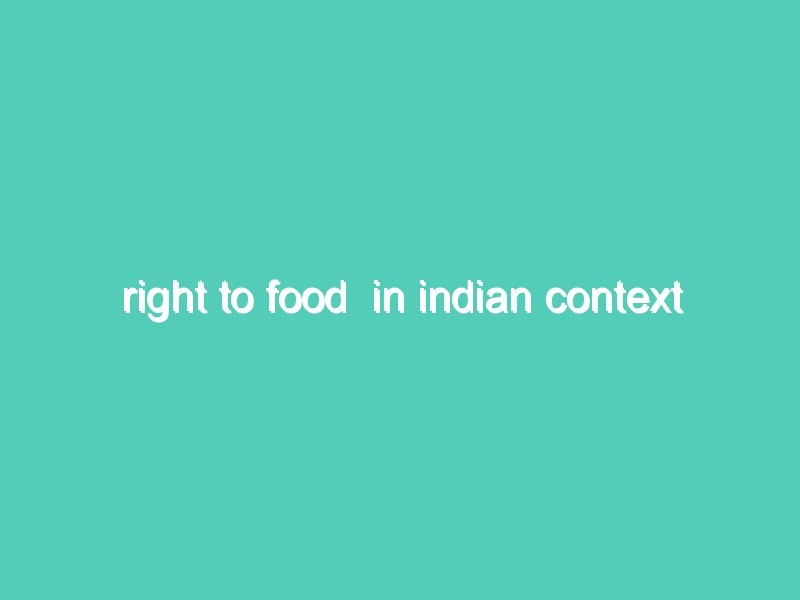“The Constitution of India has the right to everything, but in practice, the people have the right to nothing,”
In any rights system there are three distinct roles to be fulfilled: the rights holders, the duty bearers, and the agents of accountability. The task of the agents of accountability is to make sure that those who have the duty carry out their obligations to those who have the rights. To describe a rights system, we need to know the identities and also the functions of those who carry out these roles. We would also want to know the mechanisms or structures through which these functions are to be carried out. Thus, we would want to know:
A. The nature of the rights holders and their rights;
B. The nature of the duty-bearers and their obligations corresponding to the rights of the rights holders; and
C. The nature of the agents of accountability, and the procedures through which they assure that the duty bearers meet their obligations to the rights holders.
The accountability mechanisms include, in particular, the remedies available to the rights holders themselves.
These are the three core components, the “ABCs” of rights systems. A rights system can be understood as a kind of cybernetic self-regulating arrangement designed to assure that rights are realized. In any cybernetic system, a goal is decided upon, and means are established for reaching that goal. In addition, there are specific means for making corrections in case there are deviations from the path toward the goal. This is the self-regulating aspect of the system. With regard to the human right to adequate food, the goal is to end hunger and malnutrition.
Any government can say it has such lofty goals. These things may even be promised in the nation’s constitution. But we know that there are many cases in which governments go off course and fail to deliver on their promises. In nations where there is an effective rights system, however, there are specific mechanisms for calling the government to account; that is, for making course corrections. The most fundamental of these mechanisms of accountability is for rights holders themselves to have effective remedies through which they can complain and have the government’s behavior corrected. This is the missing piece in India’s system for addressing the right to food. Where there are no effective remedies, there are no effective rights.
Article 21 of the Constitution of India guarantees a fundamental right to life liberty. The expression Life in this Article has been judicially interpreted to mean a life with human dignity and not mere survival or animal existence. In the light of this, the State is obliged to provide for all those minimum requirements which must be satisfied in order to enable a person to live with human dignity, such as education, health care, just and humane conditions of work, protection against exploitation etc. In the view of the Commission, the Right to Food is inherent to a life with dignity, and Article 21 should be read with Articles 39(a) and 47 to understand the nature of the obligations of the State in order to ensure the effective realisation of this right. Article 39(a) of the Constitution, enunciated as one of the Directive Principles, fundamental in the governance of the country, requires the State to direct its policy towards securing that the citizens, men and women equally, have the right to an adequate means to livelihood. Article 47 spells out the duty of the State to raise the level of nutrition and the standard of living of its people as a primary responsibility. The citizen’s right to be free from hunger enshrined in Article 21 is to be ensured by the fulfillment of the obligations of the State set out in Articles 39(a) and 47.
The reading of Article 21 together with Articles 39(a) and 47, places the issue of food security in the correct perspective, thus making the Right to Food a guaranteed Fundamental Right which is enforceable by virtue of the constitutional remedy provided under Article 32 of the Constitution. The requirements of the Constitution preceded, and are consonant with, the obligations of the State under the 1966 International Covenant of the Economic, Social and Cultural Rights to which India is a party. That Covenant, in Article 11, expressly recognises the right of everyone to an adequate standard of living, including adequate food.
Despite its strong economic growth, rapid development of information technology and the claim of being the largest democracy in the world, India remains one of the worst human rights violators in Asia. Being discriminated on the basis of caste is unfortunately a common occurrence for a large number of India’s population. demonstrates how this discrimination violates many of their fundamental human rights, including their right to food.
The practice of caste discrimination, by its very nature, is one that affects the right to food, and many other rights, as described above. In this case then, hunger is caused by social practices, not any natural causes. Furthermore, there is a strong link between the protection of the right to food (and other rights) and the rule of law. While there are legal provisions available (as will be shown in the section below) for the protection of both the rights to food and non-discrimination, these rights are clearly still being violated.
This highlights not only the indivisibility of rights whereby the denial of one right inevitably affects the enjoyment of other rights, but also the inherent relationship between the rule of law and the protection of all human rights, including the right to food. Effective rule of law does not include only legal provisions on paper, but their adequate implementation and room for redress. The right to food in particular, must be made justiciable in courts of law.



